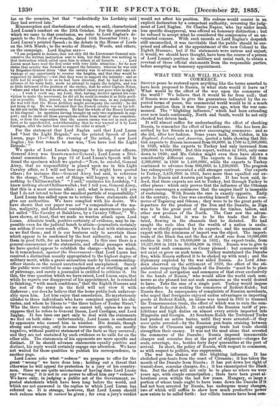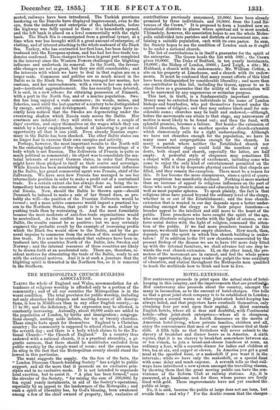• WHAT THE WAR WILL HAVE DONE FOR COMMERCE.
SHOULD peace be restored upon anything like the terms asserted to have been proposed to Russia, in what state would it leave us ? What would be the effect of the war upon the commerce of the world ? We believe that it would be far from null; that if Russia were made to give the guarantees indicated by the re- ported terms of peace, the commercial world would be in a much better position than it was three years ago, when the war com- menced. The "blighting influence," which had been extending over new lands continually, North and South, would be not only checked but driven back.
It will almost suffice for understanding the effect of checking Russia' to remember the effect of her influence. She has been de- scribed by her friends as a power encouraging commerce: and so she did, after her fashion. Some years back, Mr. Cobden, in his England, Ireland, and America, quoted a table showing that Bri- tish exports to Russia increased from 60,0001. in 1700 to 2,300,0001. in 1820, while the exports to Turkey had only increased from 220,000/. to 800,0001. But this report, written in 1835, only came down to 1820; and Mr. Cobden might even then have shown a considerably different ease. The exports to Russia fell from 2,300,000/. in 1820 to 1,489,000/., while the exports to Turkey. continued to advance from 800,090/. to 1,259,0001. The progress has subsequently presented a still stronger contrast. Our exports to Turkey, 3,438,000/. in 1853, have snore than equalled our ex- ports to Russia and Austria put together. It has been said, in- deed, that those exports are not to Turkey, but through Turkey to other places which only proves that the influence of the Ottoman empire encourages a commerce that the empire itself is incapable of sustaining. With Russia the ease is exactly opposite. Eany„ in the century, the Czar was exerting himself to foster the com- merce of Taganrog and Odessa ; they were to be the great ports of departure for the produce of the Don and the Danube as Riga was to be the great port of departure for timber, tallow, and other raw produce of the North. The Czar saw the advan- tage of trade, but it was to be the trade that he dic- tated, flowing in the channels that he dictated. He had caught the rude idea that the wealth of a nation is exclu- sively or chiefly promoted by its exports ; and the maximum of export with the minimum of import was the object. The import- trade of the Black Sea and the Sea of Azoff rose from 10,000,000 roubles in 1824 to 19,000,000 in 1832; the export-trade, from 18,327,000 in 1824 to 30,934,000 in 1833. Russia was to give to the world such commerce as Csesar pleased : but commerce will- not exist or grow on such terms. Turkey maintained the Danube free, while Russia suffered it to be choked up with mud ; and the diplomacy exploded by the war aided Russia. As Lord Aber- deen observed on the settlement of 1829, the effect of the sti, pulations respecting the islands of the Danube "must be to place the control of navigation and commerce of that river exclusively in the hands of Russia, " who would allow the world such com- merce as she pleased but not such commerce as the world desired to have. Take the case of a single port. Turkey would impose no obstacles to our seeking the commerce of Redout-Kaleh ; but Russia does. In consequence of complaints of Russian merchants, who urged that foreigners enjoyed undue advantages in importing goods at Redout-Kaleh, an ukase was issued in 1831 to trammel the Transcaucasian trade, the effect of which was to ruin the com- merce of RedoutIcaleh. It extended the Russian tariff of pro-. hibitions and high duties on almost every article imported into Mingrelia and Georgia. At Souchum-Kaleh the Trebizond Turks had pushed an active barter, until they were arrested—if they were quite arrested—by the Russian gun-boats cruising between the forts of Circassia and suppressing trade lest trade should' strengthen their enemy. It was not the mud alone that arrested the commerce of the Danube ; Russia imposed innumerable ' charges and consular fees at the port of shipment—charges 'for seals, coverings, &c., besides forty days' quarantine at the port of arrival. In short, the policy of Russia, with respect to commerce, as with respect to politics, was suppression. The war has shaken off this blighting influence. It has abolished gun-boats from the coast of Circasaia; it has taken the mouth of the Danube from Russia ; it has put down her right of transit-dues, consular charges, &c.; it has emancipated the Black. Sea. But the effect will not only be to place us where we were years ago, with simple emancipation ; there have been great al- terations even within the last few years. Hungary, so large a portion of whose trade ought to have come down the Danube if it had not been arrested by Russia, has undergone many changes, two of which will suffice to show how much productive power now exists to be called forth: her villein tenures have been cam-
muted, railways have been introduced. The Turkish provinces bordering on the Danube have displayed improvement, even to the eye, from the industry and enterprise of the inhabitants, before the highway was fully opened to them : it is henceforth opened, and the left bank is placed on a level commercially with the right bank. The Black Sea is emancipated from a piratical tyrant, at a time when war has brought with it a great amount of enterprise, of visiting, and of interest attaching to the whole seaboard of the Black Sea. Turkey, who has contracted her first loan, has been fairly in- troduced into the European system, and has had her free-trade ten- dencies confirmed. These changes have been in great part completed in the interval since the Western Powers challenged the blighting influence and undertook its removal. In the North, the favour- able changes are not so great, but they are still considerable; and the interests with which we have to deal in that region are on a larger scale. Commerce and politics are as much mixed in the Baltic as in the Black Sea. Russia has managed her marine, her customs, and her encroachments, with a view to her one rude ob- ject—territorial aggrandizement. She has recently been detected, it is said, in a new scheme for obtaining possession of Finmark, with a port in the North Sea, and of a marine population. Swe- den has long enjoyed a rude commerce; its woods, mines, and fisheries, used until the last quarter of a century to be distinguished by energy, activity, and development. But many signs have re- cently been noticed that the Swedes are degenerating under the overawing shadow which Russia casts across the Baltic. Her coastmen are indolent : they will strike work after a couple of days' exertion and enjoy themselves on the wages which they can snatch by a hasty employment, instead of labouring to get out of opportunity all that it can yield. Even already Russian supre- macy in the Baltic has been checked. The other Baltic states can no longer fear to exercise their own energies and activity.
Perhaps, however, the most important results to the North will be the enduring influence of the check upon the proceedings of a body which is not Russian. The Zollverein of Prussia is quite as much political as commercial ; its object was to consolidate the ma- terial interests of several German states, in order that Prussia might have them pledged to itself as their centre and sovereign. While Russia has been maintaining the anti-commercial influence in the Baltic, her grand commercial agent was Prussia, chief of the Zollverein. We have seen how Prussia has managed to use her intermediate position in order to make a profit out of a contraband trade. To a certain extent she has always done so, being the in- termediary between the commerce of the West and anti-commer- cial Russia. Now, should the Baltic be thrown open—should Denmark be induced to make a sale of her Sound dues, as pro- bably she will—the position of the Prussian Zollverein would be turned; and a more active commerce would impart a practical les- son to the Northern States, that profit is to be made rather by pushing trade than by restraining it. And the most formidable bemuse the most moderate of anti-free-trade organizations would be neutralized. As the conflict has not been so positive in the Baltic, the results cannot be so positive ; but we may certainly augment the probable result by the example of increasing profits which the Black Sea would show to the Baltic, and by the ge- neral impulse to commerce from the action of this country under free trade. It is not to be overlooked that railways have been in- troduced into the countries North of the Baltic, into Sweden and Norway ; and the internal resources of these countries are likely to be drawn forth at an accelerated rate. There are, therefore, re- sident motives for stimulating the trade of the Baltic, ready to act with the external motives. And it is at such a juncture that the blighting spirit is thwarted in the Northern Sea, as it is removed in the Southern.



































 Previous page
Previous page